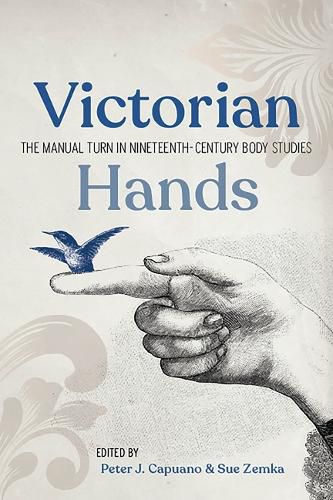Readings Newsletter
Become a Readings Member to make your shopping experience even easier.
Sign in or sign up for free!
You’re not far away from qualifying for FREE standard shipping within Australia
You’ve qualified for FREE standard shipping within Australia
The cart is loading…






This title is printed to order. This book may have been self-published. If so, we cannot guarantee the quality of the content. In the main most books will have gone through the editing process however some may not. We therefore suggest that you be aware of this before ordering this book. If in doubt check either the author or publisher’s details as we are unable to accept any returns unless they are faulty. Please contact us if you have any questions.
Until recently, the embodied hand has paradoxically escaped the notice of nineteenth-century cultural and literary historians precisely because of its centrality. The essays in Peter J. Capuano and Sue Zemka's new collection, Victorian Hands: The Manual Turn in Nineteenth-Century Body Studies, join an emerging body of work that seeks to remedy this. Casting new light on an array of well-known authors--Charlotte Bronte, Christina Rossetti, George Eliot, Wilkie Collins, William Morris, Thomas Hardy, Henry James, and Oscar Wilde--the volume explores the role of the hand as a nexus between culture and physical embodiment. The contributors to this volume address a wide range of manual topics and concerns, including those related to religion, medicine, science, industry, paranormal states, language, digital humanities, law, photography, disability, and art history. Examining hands, language, materiality, and agency, these contributors employ their expertise as Victorianists in order to understand what hands have to tell us about the cultural preoccupations of the nineteenth century and how the unique conditions of Britain at the time shaped the modern emergence of our cultural relationship with our hands. Contributors James Eli Adams, Karen Bourrier, Aviva Briefel, Peter J. Capuano, Jonathan Cheng, Kate Flint, Pamela K. Gilbert, Tamara Ketabgian, J. Hillis Miller, Deborah Denenholz Morse, Daniel A. Novak, Julianne Smith, Herbert F. Tucker, and Sue Zemka
$9.00 standard shipping within Australia
FREE standard shipping within Australia for orders over $100.00
Express & International shipping calculated at checkout
This title is printed to order. This book may have been self-published. If so, we cannot guarantee the quality of the content. In the main most books will have gone through the editing process however some may not. We therefore suggest that you be aware of this before ordering this book. If in doubt check either the author or publisher’s details as we are unable to accept any returns unless they are faulty. Please contact us if you have any questions.
Until recently, the embodied hand has paradoxically escaped the notice of nineteenth-century cultural and literary historians precisely because of its centrality. The essays in Peter J. Capuano and Sue Zemka's new collection, Victorian Hands: The Manual Turn in Nineteenth-Century Body Studies, join an emerging body of work that seeks to remedy this. Casting new light on an array of well-known authors--Charlotte Bronte, Christina Rossetti, George Eliot, Wilkie Collins, William Morris, Thomas Hardy, Henry James, and Oscar Wilde--the volume explores the role of the hand as a nexus between culture and physical embodiment. The contributors to this volume address a wide range of manual topics and concerns, including those related to religion, medicine, science, industry, paranormal states, language, digital humanities, law, photography, disability, and art history. Examining hands, language, materiality, and agency, these contributors employ their expertise as Victorianists in order to understand what hands have to tell us about the cultural preoccupations of the nineteenth century and how the unique conditions of Britain at the time shaped the modern emergence of our cultural relationship with our hands. Contributors James Eli Adams, Karen Bourrier, Aviva Briefel, Peter J. Capuano, Jonathan Cheng, Kate Flint, Pamela K. Gilbert, Tamara Ketabgian, J. Hillis Miller, Deborah Denenholz Morse, Daniel A. Novak, Julianne Smith, Herbert F. Tucker, and Sue Zemka